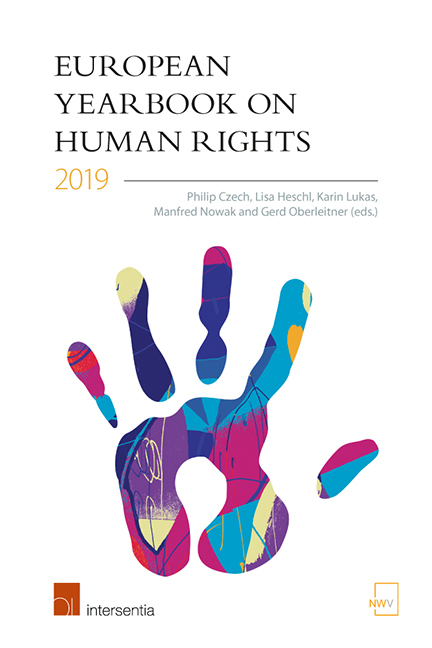Book contents
- Frontmatter
- Miscellaneous Frontmatter
- Editors’ Preface
- Contents
- List of Abbreviations
- List of Contributors
- PART I TOPIC OF THE YEAR
- PART II EU
- PART III CoE
- The Jurisprudence of the European Court of Human Rights in 2018
- Blasphemy and the European Court of Human Rights: A Small Step Forward, a Giant Leap Back
- How Do European Courts Approach the Sensitive Topic of Same-Sex Marriage? An Analysis of the Case Law of the ECtHR and the CJEU in the ‘Catch 22’-Field of Equal Marriage Rights
- The European Court of Human Rights and the Human Rights Model of Disability: Convergence, Fragmentation and Future Perspectives
- The Undermining of Article 6 ECHR
- The Right to a Nationality in Recent Case Law of the European Court of Human Rights and Council of Europe Bodies’ Work
- PART IV OSCE
- PART V REPORTS FROM THE FIELD
- PART VI OTHERS
- PART VII BOOK REVIEWS
- Index
The Jurisprudence of the European Court of Human Rights in 2018
from PART III - CoE
Published online by Cambridge University Press: 24 January 2020
- Frontmatter
- Miscellaneous Frontmatter
- Editors’ Preface
- Contents
- List of Abbreviations
- List of Contributors
- PART I TOPIC OF THE YEAR
- PART II EU
- PART III CoE
- The Jurisprudence of the European Court of Human Rights in 2018
- Blasphemy and the European Court of Human Rights: A Small Step Forward, a Giant Leap Back
- How Do European Courts Approach the Sensitive Topic of Same-Sex Marriage? An Analysis of the Case Law of the ECtHR and the CJEU in the ‘Catch 22’-Field of Equal Marriage Rights
- The European Court of Human Rights and the Human Rights Model of Disability: Convergence, Fragmentation and Future Perspectives
- The Undermining of Article 6 ECHR
- The Right to a Nationality in Recent Case Law of the European Court of Human Rights and Council of Europe Bodies’ Work
- PART IV OSCE
- PART V REPORTS FROM THE FIELD
- PART VI OTHERS
- PART VII BOOK REVIEWS
- Index
Summary
ABSTRACT
The contribution will give an overview of the European Court of Human Rights ‘(ECtHR) most important judgments and decisions in 2018, that is to say judgments and decisions that contributed to the development or the clarification of the Court's case law in a considerable way. Those judgments covered a broad range of issues such as preventive detention, secret surveillance measures, defence rights, the limits of the right to freedom of expression, the rights of opposition politicians or the rights of the surviving relatives of deceased individuals. the ECtHR also had to discuss some provisions of the European Convention on Human Rights (ECHR) which had not been dealt with oft en so far in its case law, for example Article 15 (derogation in time of emergency), Article 18 (limitation on use of restrictions on rights) or Article 32 ECHR (jurisdiction of the Court). In general, the Court still faces big challenges on account of its workload. the observance of the subsidiarity principle remains the key to the Convention system's success.
INTRODUCTION
Due to recent political changes and especially the increasing coming into power of populists in the Council of Europe (CoE) Member States, a worrying trend towards the acceptance of serious constraints of fundamental values such as the principle of rule of law, democracy and human rights can be observed. the right to liberty, the right to privacy, freedom of expression and press freedom are only some of the human rights that are at stake in that connection. In 2018, the ECtHR again contributed in an important manner to the strengthening of human rights protection with regard to those and other rights, as can be seen from the overview in section 2.
As statistics show, of the 42,761 applications disposed of judicially in 2018, 40,023 applications were declared inadmissible or struck out of the list of cases by decision of a single judge, Committee, Chamber or Grand Chamber, which amounts to a decrease of 43% compared with 2017. Around 33,200 of them were decided by a single judge (a decrease of 50% compared with 2017), 6,650 by Committees of three judges, 200 by Chambers and one by the Grand Chamber (Berlusconi v Italy).
- Type
- Chapter
- Information
- European Yearbook on Human Rights 2019 , pp. 189 - 220Publisher: IntersentiaPrint publication year: 2019



